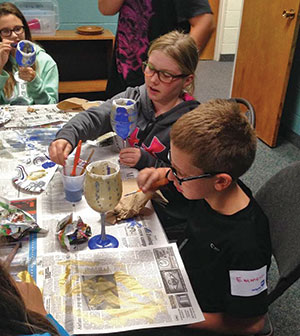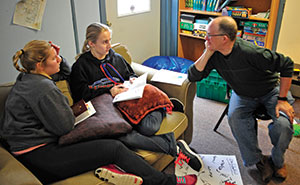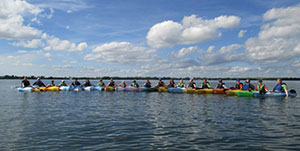Summer has always been a busy time for camps, hosting hundreds of kids at a time where days can be spent swimming, hiking or singing around campfires. But what happens when fall rolls around and kids have to swap their swimsuits for textbooks? Camp directors just lock the cabins and kick back until Memorial Day, right?
Not quite.
For a majority of ELCA outdoor ministries, the school year marks a season full of retreats and community and congregational outreach.
“Winter programming has really been growing over the years,” said Don Johnson, executive director of Lutheran Outdoor Ministries, an organization for camp and retreat center leaders. “Back in the 60s there were very few camps that were doing year-round programming, but now more and more camps have been improving their accommodations and all of their facilities in ways that make winter programming a very comfortable experience.”
Outdoor ministries aren’t just for the young anymore, and the school year can be a time for the young at heart to enjoy what camps have to offer.
“The outdoor ministry experience is such a moving and life-impacting experience,” Johnson said. “Those who experienced it when they were younger grew into adults and were very seriously asking for the camp they went to in the summer to provide opportunities for them to experience camp as adults.”

COURTESY OF METIGOSHE MINISTRIES
Ava Lee (left) and Emmett Kersten from Zion Lutheran Church, Berthold, N.D., paint chalices at a first communion-themed “Metigoshe in Motion” retreat, a ministry of Metigoshe Ministries in Bottineau, N.D.
Johnson said the move to year-round programming, while sometimes a necessary financial choice, was made to expand mission: “[It] came as outdoor ministry organizations strived to live more fully into their mission, which is to provide faith formation and church leadership formation programs for all people and to do that in a setting apart from your normal routine.”
Camp in congregations
For some outdoor ministries that means taking what their camp has to offer on the road. During the school year, Metigoshe Ministries in Bottineau, N.D., takes its “Metigoshe in Motion” program to congregations.
“The program brings the gifts of camp ministry to a congregational context to provide affordable and sustainable ministry support,” said Jon Halvorson, executive director of Metigoshe. Programs might include deepening church relationships through intergenerational events or helping enhance confirmation ministry.
Metigoshe also stays busy year-round with retreats that range in focus from quilting to first communion to grandparent getaways, hosting more than 7,000 guests per year through its retreat center.

DAVID JOEL PHOTOGRAPHY
Bethany Nelson (left) and Alana Robinson, members of First English Lutheran Church, Cannon Falls, Minn., attend a Peer Ministry Leadership retreat at Luther Park, Danbury, Wis., led by Lyle Griner, the program’s national director. The program aims to develop faith and leadership skills in youth and young adults.
Luther Park Camping and Retreat Center in Danbury, Wis., is also known for its many retreats, which host children, adults and families year-round.
One program that is getting extra attention this year is its congregational leadership program, for which Luther Park received a grant from the youth and young adult initiative of Always Being Made New: The Campaign for the ELCA.
“For many years, Luther Park has offered leadership programs, but now we wish to be more effective at helping grow sustainable leadership-producing cultures within congregations,” said Joel Legred, executive director of Luther Park.
The program will train participants in relational Peer Ministry Leadership. It aims to form faith in youth and young adults and develop them into leaders, not just in their congregations but also in their communities. Over the next two years, Luther Park will work with 10 congregations to train high school youth and adults in relational Peer Ministry Leadership.
Fulfilling the mission

Bible study is often a floating experience at NeSoDak, an outdoor ministry in Waubay, S.D., that focuses on its summer programming by closing for part of the year.
Some outdoor ministries use the seasons outside of summer to reach out and become more ingrained in their communities.
Agapé + Kure Beach Ministries in Fuquay Varina, N.C., does this through its Agapé Center for Environmental (ACE) Education, a program designed to meet the goals for science and social studies set forth by the North Carolina Department of Public Instruction. During the school year, public and private schoolchildren visit the outdoor ministry on field trips to explore the many ecosystems that exist on Agapé’s property, which includes 624 acres along the Cape Fear River.
“Our ministry teaches appreciation for and understanding of God’s creation as a major priority to fulfill our mission,” said Mir Youngquist-Thurow, ACE Education director.
The program serves kindergarten through eighth-grade students, and teachers can choose from 65 environmental education topics that provide experiential learning opportunities. ACE Education reaches more than 5,000 children and adults every school year, and more than 80,000 people have participated since the program was formed in 1998.
For some camps, their strength is in summer programming and that’s where they choose to dedicate their time and energy. This is true for NeSoDak, Waubay, S.D., a camp that closed down this school year so year-round staff could reallocate their time and energy to summer programming.
During the summer, NeSoDak campers can often be found enjoying the camp’s lakeside location on paddleboards or having a floating Bible study on a pontoon. But during this “off season,” the focus is on three areas: strengthening community, programming and facilities, which includes building two year-round cabins in each of the camp’s villages.
Staff is spending time visiting donors, going to colleges to recruit summer staff and working on curriculum.
“It’s our hope that being strengthened in these areas we are able to offer a unique and powerful ministry where guests of all ages, backgrounds and stories are renewed and empowered within a community built on love and grace to go out into the world to live a life of love and grace,” said Jake Hanson, executive director of NeSoDak.
Johnson said, “In whatever form of programming it may be, our outdoor ministries put their mission at the focus and make conscious decisions to be able to continue providing lasting, formative experiences for everyone involved.”




